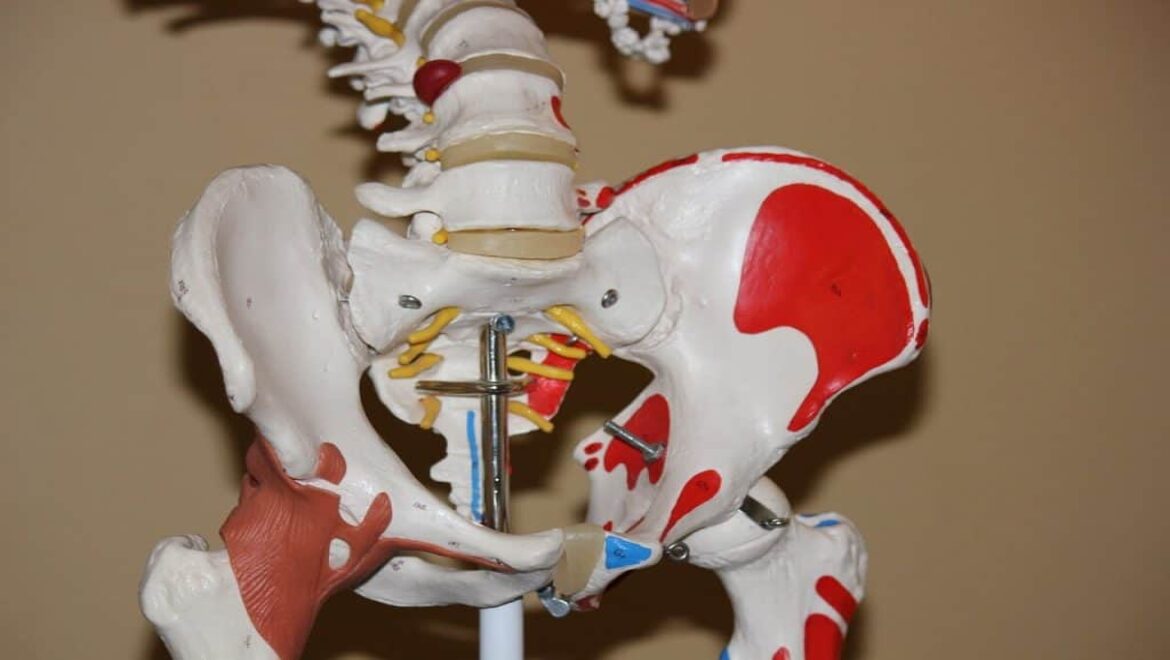
Symphysis Pubis Dysfunction (SPD for short) is a pregnancy related condition that causes pain and discomfort in the pelvic area. Sometimes you’ll hear it referred to as Pelvic Girdle Pain or PGP as well.
Let’s find out more about this common condition, the symptoms you might expect and what kinds of treatment might be offered.
What is SPD?
SPD is a common cause of pelvic pain in pregnancy.
To really understand what SPD is and why it causes pain at this time, we need to think about the shape of the pelvis.
Your pelvis is mainly made up of two strong, large bones which create that iconic pelvic shape.
At the front of the pelvis, the bones meet and this point is called the ‘symphysis pubis’.
This is where the pain is likely to occur.
The reason for this pain is because this meeting point is strengthened by ligaments.
Your ligaments are affected by your pregnancy hormones and this puts extra pressure on the symphysis pubis, destabilizing it to a certain degree. This is why the pain occurs.
SPD is a type of pelvic girdle pain (PGP), and this is what your condition may be referred to when you visit a doctor or physical therapist to talk about treatment options.
Does SPD Always Happen in Pregnancy?
Not always. The reason that SPD occurs is due to hormones, one called ‘relaxin’ to be exact.
This hormone helps to soften and relax the ligaments in your pelvis, which allows your bones to move a little and birth to occur much more easily. Your baby has to pass through this area remember!
Previously it’s been mentioned that the symphysis pubis is strengthened by ligaments.
During a normal pregnancy your body compensates for the relaxation/laxity of ligaments in this area, but occasionally that doesn’t happen.
SPD is thought to happen when:
- Your pelvic joints don’t move in correlation with each other
- Your body doesn’t react in the right way to the relaxin hormone
- You might have a joint in the pelvis which is weak or doesn’t work as well as the others
- General weakness in the pelvic area
Any of these situations means that your pelvis isn’t as strong, and that is when SPD can occur.
The condition can happen at any point during your pregnancy, and it can sometimes happen after birth too.
Symptoms of SPD
The main symptoms of SPD include:
- Pain in the groin and pelvis
- Pain on the pubic bone
- Pain in the back
- Hip pain
- A clicking or grinding noise or feeling in the pelvis when you move
- Not being able to sleep well due to the pain – SPD pain can sometimes be worse at night time
- Worse pain when walking, moving when you’re in bed, or walking up or down steps/stairs
If you notice any of the above, speak to your midwife or doctor.

How is SPD Treated?
The treatment for SPD depends on the severity of your symptoms. If you have a mild case self help will probably be suggested. It is often something you just have to live with and get through the best you can.
For more debilitating cases the focus of treating SPD is around physical therapy in order to strengthen muscles around the joint itself.
During your session appointment you will be given exercises to do at home, as well as exercises to do with your physical therapist.
Your physical therapist will also focus on giving you advice to help with pain during birth, and pain reduction in your day-to-day activities e.g. when sleeping/walking around.
There are a few other things you can try to help reduce the pain and discomfort of SPD, but check them out with your doctor, midwife, or physical therapist before embarking on any of them.
These include:
- Acupuncture – Be sure to find a practitioner who is experienced in pregnancy treatment
- Osteopathy – Again, find a practitioner experienced in pregnancy treatment
- Using a pelvic support belt – This is something your physical therapist can advise you about, and it may help you with pain during your daily tasks or when you’re exercising
Aside from this, there are some standard ways to cope which you can incorporate into your daily routine:
- Don’t push yourself further than you feel you can go. Ask for help around the house, or with any other activities
- Be careful when climbing stairs, getting in or out of the bath, or getting out of a car. Parting your legs can exacerbate pain, so don’t go too far than is comfortable
- Avoid sitting with your legs crossed
- Avoid carrying children on your hip
- If you can sit down to do a task, do so – standing for long periods of time can make the pain worse
- Avoid lifting anything heavy, and pushing anything heavy, such as supermarket trolleys
- Never stand on one leg only, e.g. when putting pants on – sit down to complete the task
- Sleep on your side, with a pillow between your knees, and your legs bent
- When getting out of bed or rolling over in bed keep your knees together to minimize pain
- Use walking sticks if need be
Will SPD Disappear After Birth?
It is likely that your SPD will begin to ease after you have delivered, and it should resolve within a few months after giving birth.
You should continue with your physical therapy exercises until the SPD has completely gone, and remember not to push yourself in the weeks after delivery.
The bad news is that if you have experienced SPD in a prior pregnancy, it’s more likely that your next pregnancy will also be affected.
Sources:
- https://www.nct.org.uk/pregnancy/worries-and-discomforts/common-discomforts/pregnancy-related-pelvic-girdle-pain-pgp-pregnancy
- https://obgyn.onlinelibrary.wiley.com/doi/pdf/10.1576/toag.8.3.153.27250
- https://www.ncbi.nlm.nih.gov/pmc/articles/PMC3364059/
- https://www.parents.com/pregnancy/my-body/aches-pains/spd-in-pregnancy-what-is-symphysis-pubis-dysfunction/
- https://www.physio-pedia.com/Pubic_Symphysis_Dysfunction
- https://www.cochranelibrary.com/cdsr/doi/10.1002/14651858.CD012441/full
